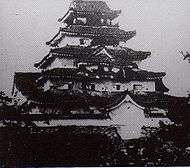Kōjō no Tsuki


"Kōjō no Tsuki" (荒城の月 lit. "The Moon over the Ruined Castle") is a Japanese song written in the Meiji period.
Japanese pianist and composer Rentarō Taki composed the music as a music lesson song without instrumental accompaniment in 1901. The song was included in the songbook for Junior High School students. The music of the song was inspired by the ruins of Oka Castle whereas the lyrics, written by Bansui Doi, were inspired by the ruins of Aoba Castle and Aizuwakamatsu Castle.


Taki's original version of the song is a B minor song, but Kosaku Yamada's slow-paced nostalgic D minor version is also popular as an accompanied song. Taki's original version of the song uses E♯ on the second bar, but the modern version usually uses E probably because the original version did not fit the traditional Japanese music.
Japanese tenor singer Yoshie Fujiwara put his singing of the song on a record in 1925. He was the first Japanese singer to popularize the song throughout the world.[1]
A jazz arrangement was recorded by Thelonious Monk under the title "Japanese Folk Song" on his 1967 album Straight, No Chaser.
The song was sung and recorded live in the form of a power ballad by the German heavy metal band Scorpions, during a concert at the Nakano Sun Plaza in Tokyo. It was released on their 1978 live album Tokyo Tapes. The band's version was one of rare tracks following Taki's original version quite well.[2] This Song was also performed by Yngwie Malmsteen during the 1984 Alcatrazz Japan Tour. A live recording of his performance at the Sun Plaza Tokyo was released on the "Metallic Live" DVD of Alcatrazz. Takeshi Terauchi & Blue Jeans, a Japanese band, recorded an instrumental rock cover of "Kojo no Tsuki" on their album Let's Go Blue Jeans.
The song was also live sung by Japanese enka singer Kiyoshi Hikawa in 2008.[3]
References
- ↑ 荒城の月のすべて [All of the Moon over the Ruined Castle] (in Japanese). King Records. Retrieved 2009-01-22.
- ↑ 荒城の月のすべて [All of the Moon over the Ruined Castle] (in Japanese). Kotenha.com. Retrieved 2009-01-22.
- ↑ https://www.youtube.com/watch?v=pjNjg5sl0Nw
External links
- Lyrics, translation and background information
- Rentaro Taki, Kojo no Tsuki, "The Moon over the Ruined Castle" on YouTube – Kojo no Tsuki
- Rentaro Taki, Kojo no Tsuki(with lyrics) on YouTube – Kojo no Tsuki(with lyrics)
- 寺内タケシ&ブルージーンズ – 荒城の月 on YouTube – Takeshi Terauchi & Blue Jeans – Kojo no Tsuki